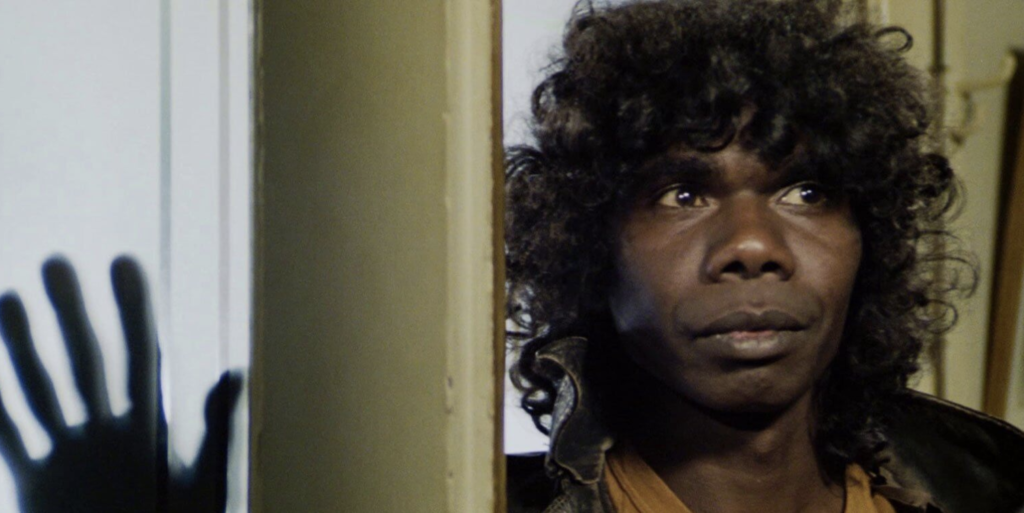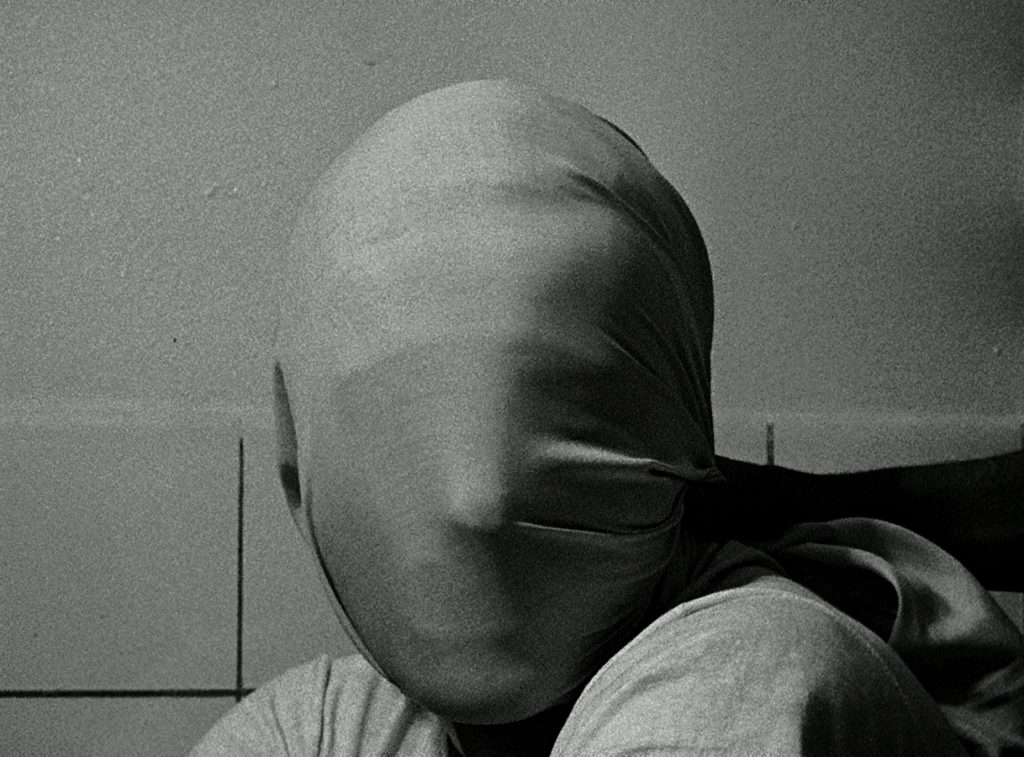| Cole Seidl |

The Last Wave plays at the Trylon from Friday, September 15th, through Sunday, September 17th. Visit trylon.org for tickets and more information.
It is not particularly difficult to find films of resistance, or films in which colonized subjects fight back, asserting their rights and their refusal to go along peaceably with the agenda of their colonizers. Seek out the cinema of any colonized people and there will be many examples: Divine Intervention (2002) and The Time That Remains (2009) by Palestinian filmmaker Elia Suleiman, The Battle of Chile (1978) by Chilean Patricio Guzman, Soleil O (1970) by Mauritanian Med Hondo, and Black Girl (1966) by Senegalese Ousmene Sembene are resistance films that cut across a wide range of both geography and political contexts.
On the other hand, it is extremely difficult to find films of culpability, or films in which the direct beneficiaries of colonialism investigate themselves and acknowledge both the wrongs that have been committed, and their role—their actual culpability—as a part of an active colonial present-day context. The best example of this culpability that I can find is French filmmaker Rene Vautier’s Afrique 50 (1950).

Afrique 50 is a 17-minute short, originally commissioned by the French government to show “the positive effects of colonialism,” primarily by highlighting the superior French education the colonized subjects in West Africa were allegedly receiving from their French colonizers. Vautier’s film, for the first several minutes, appears in line with the spirit of that original assignment. However, each passing minute grows more inquisitive, then more aghast, and finally ends on a note of righteous rage. Sure, the French were educating West Africans… but only enough of them to serve as accountants and managers for colonial industries. They were not, however, educating the vast majority of people because most people were busy with backbreaking manual labor, extracting resources from their own land, and giving it to France for a fraction of its value. By the end, Vautier’s film hints at a sentiment expressed directly by Indonesian anti-colonial novelist Pramoedya Ananta-Toer in his novel Child of All Nations. There, his character Minke states, “The natives were closer to European science and learning, closer to understanding the power that rested with European peoples, to know how to use that power, and so they rebelled.”1 Pramoedya argues, and Vautier seems to concur, that colonial forces inherently understand that even a colonial education can still sow the seeds for revolution. This is the real reason it is both pushed as the friendly face of colonialism, and simultaneously withheld in actual practice.
Vautier boldly submitted his version of the film in place of a milquetoast piece of colonial propaganda. He was indicted on thirteen different counts and sentenced to a year in prison. The film was banned by the French government and remained prohibited from public exhibition for over 40 years.2
Jean-Luc Godard’s second film Le Petit Soldat couldn’t even really be considered a film of culpability, at least not by the standards set by Rene Vautier. However, it engaged with the French colonization of Algeria and the Algerian peoples’ rebellion with an ambivalence that also proved too much for the French government. The film was completed in 1960, but wasn’t allowed to be screened publicly until 1963, and was not exported to the rest of the world until 1967. Any implication that European presence in Africa might not be entirely positive for all parties involved had to be suppressed.

If we consider our individual interpersonal relationships, this probably doesn’t seem all too surprising. Most of us can pretty easily compile a list of instances where we were treated improperly. Could we all come up with a list of all the times in which we treated someone else improperly? If we could, would we want to dedicate our time, money, and creative energy toward deconstructing the actions on that list? Perhaps this can be extrapolated outward toward entire cultures to partially account for the dearth of films of culpability. Regardless of the exact cause, the glaring deficiency of films in this vein means that we ought to celebrate films that do make an attempt, successfully or not, at investigating colonial culpability. Peter Weir’s The Last Wave (1977) is a film that makes an earnest attempt at this investigation. It also attempts to do so in a form that has a degree of mainstream appeal.
The lens of colonial culpability is far from the only point of entry to appreciate this film. As with most of Weir’s films, The Last Wave is practically frothing over with an eerie atmosphere that is contradictorily subtle and overbearing. There’s no real reason to feel we’re in a horror film, but there is an absolutely unavoidable feeling of dread, an overall aesthetic of hopelessness. These aesthetic qualities, however, seem to lend credence to an anti-colonial reading of the film. The film is, in essence, an apocalypse story. The unique aspect here is that the end of the world has been brought about by European colonialism. The movie, on the surface, requires us to buy into a sort of orientalist framing of indigenous mysticism, but just beneath that surface is the unspoken feeling that the end of the world is now inevitable, though it hadn’t been before the crime.
One aspect of the film that has sadly aged incredibly well is the linking of the apocalypse to climate disaster. The film begins with a series of disconcerting weather abnormalities all building toward the destruction of modern civilization. In 2023, this is no longer merely an “allusive ominous atmosphere” or “hokum without the fun of hokum” as Pauline Kael stated in her review of the film;3 it is the impending dread on most young people’s minds. For us, as beneficiaries of colonialism, there’s another component to that impending dread. The chorus to Radiohead’s “Just” cries out, “You do it to yourself, you do, and that’s what really hurts”, which applies both to this film’s perspective on the doomed Colonial Australians and also the reality of real-life climate change. In 2022, the Intergovernmental Panel on Climate Change released a report stating that “officials and scientists from around the globe now recognize the significant role colonialism has played in heating our planet and destroying its many gifts.”4 This is an instance in which a film’s “hokum” grows painfully more truthful with passing generations.

The Last Wave is a profoundly hopeless film. There’s a feeling that it was too late before the film even began; before our theoretical “white savior” Richard Chamberlain can even start the necessary soul-searching to put the pieces together. All was always already lost. Genuine self-critique can be painful. Acknowledging culpability is profoundly uncomfortable. This film is attempting, perhaps blindly, to do these things and the pain and discomfort is there for us to share in.
One of the troubles of a cinema of culpability comes from the frustrations tied to the imperfections of the figures making the films. Weir has, on occasion, been accused of culturally tone-deaf decisions (casting Linda Hunt in yellowface as a major role in The Year of Living Dangerously (1982) remains a particular sticking point when discussing his filmography in the context of colonial culpability) and it seems difficult to parse a genuine film of culpability from what is often referred to as a “white savior” narrative.

Indeed, The Last Wave appears to fit the mold of the traditional white savior narrative, at least at first. However, I believe the distinction comes, specifically, from the film’s utter hopelessness. Richard Chamberlain’s white Australian lawyer thinks he is a connection to the indigenous dream world. The final 25 minutes of the film move beyond clear plot machination into a film form comprised almost entirely of poetics. However, it seems he is naively believing that he can harness this connection to stop the inevitable. The final image lingers, casting his character, his prior beliefs, and indeed, the whole white savior mythology in complete shadow. White savior narratives, in the end, are supposed to uplift (that is, if you find yourself identifying with a specific group of people). The Last Wave pushes us under, disoriented, no longer aware which way is up. It provides no solutions, and so, acknowledges that our protagonist and our filmmaker are not equipped to provide them either.
Footnotes
1 Toer, Pramoedya Ananta. Child of All Nations. Translated by Max Lane. Penguin Books, 1996.
2 Genova, James Eskridge. “The Postcolonial African Regime of Representation.” Cinema and Development in West Africa. Bloomington: Indiana University Press, 2013.
3 Not Pauline Kael. “A Review of The Last Wave (1977).” Letterboxd. Accessed (November 17, 2006). https://letterboxd.com/notpaulinekael/film/the-last-wave/.
4 Anuradha Varanasi, Kopal, and JR Corn. “How Colonialism Spawned and Continues to Exacerbate the Climate Crisis.” State of the Planet (September 23, 2022). https://news.climate.columbia.edu/2022/09/21/how-colonialism-spawned-and-continues-to-exacerbate-the-climate-crisis/.
Edited by Olga Tchepikova-Treon
